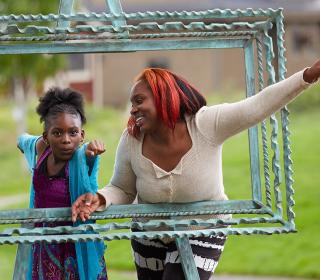For 130 years, YWCA has provided critical resources for women and families experiencing gender-based violence. Thanks to our team, our community, and our commitment to equity and welfare, today we are the largest service provider in the region for people experiencing domestic violence. As part of Domestic Violence Awareness Month, YWCAs around the country take an extra step to show our support for survivors as we work to end domestic violence against all people.
What is Week Without Violence?
At YWCA, we know that not all violence is acknowledged or responded to equally and that some victims go unrecognized altogether. That’s why for over 20 years YWCA has set aside one week in October as a Week Without Violence, during which we raise awareness, elevate survivor voices, talk with policymakers, and unite under a common goal: centering survivors and working together to end gender-based violence.
Gender-based violence is any type of harm that is perpetrated against a person or group of people because of their sex, gender, sexual orientation and / or gender identity.
Domestic violence is a pattern of abusive behavior in relationship that is used by one person to gain or maintain power and control over the other.
Domestic violence can be present in any kind of relationship — platonic, romantic, familial, or otherwise. There are many different types of domestic violence: physical violence, sexual violence, psychological violence, and emotional abuse are just a few examples. Domestic violence can also include other patterns of coercive behavior used by one person to influence or manipulate another person in a relationship, including tactics meant to intimidate, manipulate, humiliate, isolate, frighten, hurt, injure, or wound someone.
Domestic violence and gender-based violence can happen to anyone, regardless of their race, gender, age, religion, education, class, or sexual orientation.


(via Domestic Violence Network, 2023)
YWCA's commitment to ending Gender-based violence
YWCA offers various Gender-Based Violence Specialized Services that utilize a trauma-informed care approach and survivor-centered model in order to best serve and support victims of abuse on their path to overcoming and healing from their trauma. Our services include individual assistance with safety planning and issues related to gender-based violence as well as weekly support groups, and our advocates provide intensive, individualized services to survivors who are furthest from opportunity, particularly Black and African American women.
In 2023, 100% of domestic violence program participants gained tools and awareness to support their personal safety and goals.
In our ongoing fight to end gender-based violence, it is critical that we center survivors in our advocacy work and address the challenges they face on their path to safety, healing, and freedom from further violence. It is our goal to inspire our community to be allies to survivors along with YWCA.
How can I participate?
Anyone can participate in Week Without Violence — from planning and hosting an event to campaigning with friends to contacting your legislators or engaging with us on social media, there are a number of ways to get involved with this campaign to end gender-based violence. Learn more about Week Without Violence and get access to a digital toolkit with educational resources, promotional materials, and more to help plan your event.
Learn how to support survivors of domestic violence, and learn more about YWCA's Gender-Based Violence Specialized Services programs.
Ana Rodriguez-Knutsen is the Content Specialist for YWCA's Marketing & Editorial team. From fiction writing to advocacy, Ana works with an intersectional mindset to uplift and amplify the voices of underrepresented communities.
We share the stories of our program participants, programs, and staff, as well as news about the agency and what’s happening in our King and Snohomish community.


